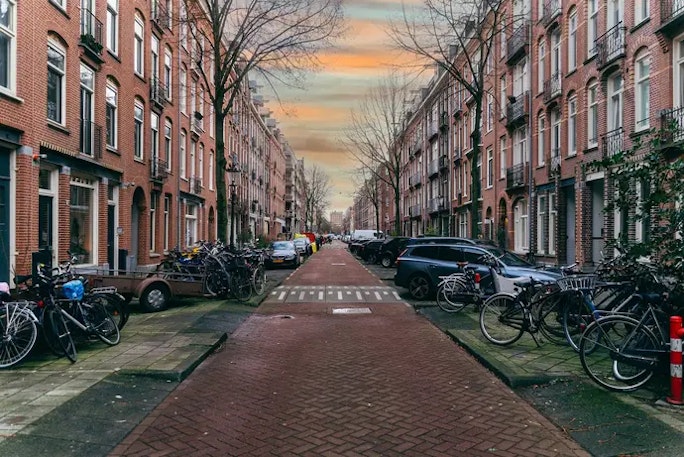Table of contents
There is one thing every home buyer talks about in the Randstad: leasehold. As if the sky-high house prices weren't making it difficult enough to afford a nice home, you quickly end up paying (tens of) thousands of euros extra for the leasehold on your home. Unfortunately, it's something many of us have to deal with. Are you looking for a house to buy? Read this article to find out everything you need to know about leasehold, so you don't get any surprises when you're about to pop the champagne.
- Receive proposals from multiple real estate agents
- Get clarity on the costs in advance
- Choose based on performance and results
- Over 3000 people have gone before you
- An average of 2% higher sales yield
- Free & non-binding
- Independent
- Non-binding
- Free
- Fast
What is leasehold?
Have you spotted a gem of a house on Funda, and does the price seem almost too good to be true? Let's burst that bubble right away: it usually is. Always check the fine print under 'features' on Funda. It indicates whether the property is subject to leasehold. Are you already a bit further in the process? The deed of transfer and the purchase contract always specify whether there is a leasehold right.
If there is indeed leasehold, the plot of land - on which the house stands - remains the property of the lessor. The lessor is usually the municipality, but it can also be a housing corporation or the State Forest Service, for example. As a leaseholder, you get the right from the owner (the lessor) to use the plot of land and the house on it as if it were your own property, unless otherwise agreed in the deed.
What is a leasehold canon?
If you buy a property with leasehold, you do not become the owner of the plot of land. You are essentially buying a right of use, for which you pay a fee to the owner. A strange construction, actually, right? The fee you pay to the owner is called a 'leasehold canon' and is usually paid annually. You can think of the canon as a form of rent to the land lessor (owner). How much canon you have to pay for the use of the land is stipulated in the leasehold agreement.
Leasehold with building rights
To make it even more complicated: the leasehold right may also be linked to building rights. As a buyer, you are the owner of the house, and the land lessor is the owner of the land. When the leasehold ends, the building rights associated with it also end. This means that the land lessor also becomes the owner of the house at that time. However, the land lessor must then reimburse you for the value of the house.
Continuous and perpetual leasehold
You now have a nutshell understanding of what leasehold is, but there's more. Leasehold can take different forms. For instance, there is continuous leasehold and perpetual leasehold. With continuous leasehold, the current land value is reassessed every 50 or 75 years, and the leasehold canon is adjusted accordingly. As you might guess, in most cases, the leasehold land value increases significantly, causing leasehold costs to suddenly skyrocket. Don't be caught off guard by this.

With perpetual leasehold, it's a bit different. Here, the amount of the leasehold canon is determined once and fixed forever. The nice thing about this is that you have certainty about the amount to be paid (the level of the canon). For now and for the future.
Leasehold conditions
Not the most exciting topic, we know, but very important: the leasehold conditions. In the leasehold conditions, the lessor has set out the rules that apply to the leasehold. You will find information about who the lessor is, how long the leasehold lasts, the amount of the canon, buying off the canon, revision of the canon, and the designation of the land and the house. You will also read about the possibilities for termination. Good to know: in some cases, you may need the lessor's permission to transfer the leasehold right (when selling the house).
Do you find the leasehold conditions difficult to read? It's definitely not you. The conditions are a hell of a task to understand. If you're having trouble deciphering them, it's helpful to seek advice from a notary. He or she is impartial and knowledgeable about leasehold. It saves you a lot of hassle and time - you probably have better things to do on your free evening or day off!
Where can the leasehold conditions be found?
You can find the leasehold conditions in the deed of issuance of leasehold. In addition to these leasehold conditions, there are sometimes also 'general leasehold conditions'. This is, for example, the case with municipal leasehold. These general leasehold conditions are stated in a notarial deed. The deed of issuance in leasehold always refers to those general leasehold conditions when they apply.
Buying off leasehold
In addition to paying the leasehold canon annually, you can also buy off the canon. In that case, you pay a one-time buyout amount for a certain period - for example, 50 years - (continuous leasehold) or forever (perpetual leasehold). Are you interested in buying off your leasehold? Check the conditions on your municipality's website.
Is it wise to buy off leasehold?
That fully depends on your situation. Buying off the leasehold canon has various advantages and disadvantages.
Advantages of buying off leasehold
- You no longer pay a leasehold canon after paying the buyout sum
- Your house becomes more attractive for sale, as homebuyers prefer a property with perpetually bought-off leasehold. You therefore reduce the risks of selling a property with leasehold
- Your property value increases if the leasehold is bought off
- You can take advantage of mortgage interest deduction when you finance the buyoff leasehold with your mortgage
Disadvantages of buying off leasehold
- You face a (often) high buyout sum, and thus a high one-time expense
- If you finance the buyout sum with your mortgage, your monthly mortgage payments will increase
- You cannot deduct the buyout sum from taxes. You may not deduct the buyout sum from your taxable income
Fixing leasehold
Besides buying off your leasehold, you can also opt to fix your leasehold. In that case, the municipality will make you a proposal for a leasehold canon. This proposal is usually higher than the monthly canon you currently pay.

If you accept the proposal, your leasehold canon is fixed forever - it will never be recalculated. This gives you certainty about the amount and your future monthly expenses. In Amsterdam, you only need to start paying the higher leasehold canon after your current period has ended. In other cities, you pay the higher leasehold canon immediately.
Advantages of fixing leasehold
- You have certainty about the amount of the leasehold canon
- You don't have to worry about the impact of rising property prices on your leasehold canon
- You enjoy fiscal benefits; you can deduct the leasehold canon from your taxable income, resulting in less tax liability
Disadvantages of fixing leasehold
The leasehold canon after fixing is almost always higher than the current leasehold canon. If you live in a city where the higher leasehold canon takes effect immediately after fixing, your monthly expenses will increase immediately.
The costs of leasehold
How much you pay for the leasehold canon depends on various factors. Think of the value of the land, the intended use of the land, and the management and administration costs. Check the leasehold conditions for the exact amount of the canon.
If you want to calculate how much it costs to buy off the leasehold, you need to know the land value and the canon percentage. The municipality of Amsterdam has a special tool developed to calculate the cost of buying off the leasehold canon perpetually. Do you live in another city? Check the municipal portal for buying off leasehold.
Are the leasehold costs deductible?
Yes, the leasehold costs you pay annually are deductible from income tax. The same applies to the mortgage interest you pay. If you buy off the leasehold, the interest on the loan or mortgage - with which you buy off the leasehold canon - is deductible from taxes. The buyout sum itself is not tax-deductible. You may not deduct the buyout sum from your taxable income. If you fix (set) the leasehold canon, it is deductible.
Leasehold and mortgage
Do you have your eye on a property with an established right of leasehold? This affects the amount you can borrow from the bank. Of course, you can only spend your money once. The money you spend on paying the ground rent cannot be spent on your mortgage. Therefore, the bank wants to know in advance what the situation regarding the leasehold is. Has the ground rent been bought off, or must it be paid every year? And until when is the ground rent bought off - in perpetuity or until a certain date in the future?
Taking out a loan for the purchase of a leasehold
Did you know that you can also take out a loan for the purchase of a leasehold? In that case, you finance the leasehold along with your mortgage. Banks are somewhat more hesitant about financing the purchase of a leasehold. They are more likely to give you a mortgage for the purchase of full ownership of the land with the house on it.
Whether the bank grants you financing for the purchase of the leasehold depends, among other things, on:
- The amount of the leasehold ground rent
- The revision date of the ground rent (and thus the risk of a significant increase)
- The contents of the leasehold conditions (e.g., restrictions on use)
- The owner of the land (whether it is the government or not)
- The type of leasehold: is it a leasehold for an indefinite or definite time?
Leasehold opinion for leaseholds before 2013
Is the leasehold established before 2013? Then banks require a leasehold opinion. You can request this from the notary, both as a buyer and as a seller. Such a leasehold opinion tests the leasehold conditions. If the opinion is 'green', the leasehold is financeable. If the opinion is 'orange', financing becomes difficult. A 'red' opinion indicates that the bank will not provide financing.
Tip: include a financing condition in the purchase agreement, so you can withdraw from the purchase of the leasehold if you do not get financing.
Leaseholds after 2013
For leaseholds that have arisen from January 1, 2013, a leasehold opinion cannot be requested. For these leaseholds, each bank determines based on its own policy whether or not to proceed with financing.
- Receive proposals from multiple real estate agents
- Get clarity on the costs upfront
- Choose based on performance and results
- Over 3000 people went before you
- On average 2% higher sales proceeds
- Free & without obligation
- Independent
- Without obligation
- Free
- Fast














